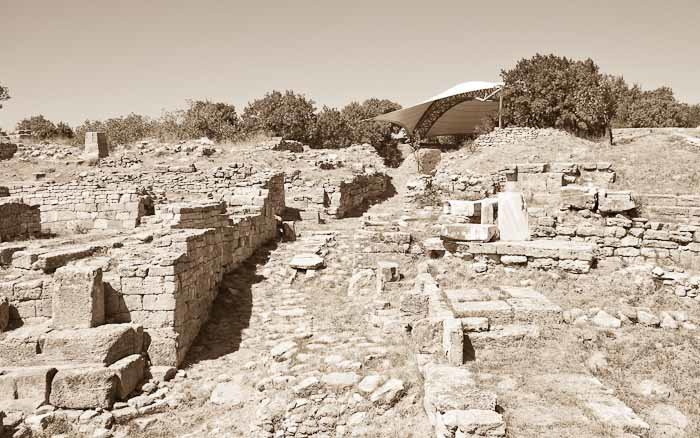Is Troy Worth Seeing?
I wasn’t, honestly, going to let my spawn leave Turkey without inflicting Troy on him.
I’m still in a strop with myself for missing Baalbek in Lebanon (some minor kerfuffle about carjackings and kidnappings…).
And to leave Turkey without seeing Troy?
Just ain’t gonna happen.
When it comes to classics, I’m a complete geek.
I studied Classics! I read Homer in the original!
I went to snigger at Brad Pitt in Troy the same day it hit the cinemas (2004 was a bumper year for crap films). I’ve even just finished reading The Song of Achilles.
And, further, Troy is on the way from Istanbul to one of the towns with boats to Greece.
I mean, it is ACTUALLY ON THE WAY TO WHERE WE ARE GOING.
“Look,” Zac says, as I tentatively broach the topic of yet more ruins. “EVERYONE knows that Troy’s not worth it. Everyone knows it’s a complete waste of time.”
“I don’t care,” I say. “It’s Troy! AND they have a Trojan horse!”
“So?” he says.
“It’s a TROJAN HORSE! At TROY!” I say.
My son mutely channels Stewie from Family Guy.
“OK,” I say. “Let’s just do it as a BSD.”
“OK,” he says. “So that’s climb into the wooden horse, and then out.”
“No,” I say. “It’s a couple of hours. Climb into the wooden horse. Walk round whatever’s left of Troy, and then I’ll buy you ice cream or baklava.”
“Alright,” he says, rather sullenly.
The problem with Troy, you see, is this. Heinrich Schliemann, a nineteenth century businessman who managed to teach himself a dozen or so languages despite having left school at fourteen, was obsessed with the historical truth of Homer’s poetry.
Well, apart from the bits about the gods, I guess.
In a frankly insane, if not entirely original, piece of historical detective work, he decided that a mound in Turkey fitted the descriptions of the geography of Troy, proceeded to hire huge numbers of workmen and dug, dug, dug until he found it.
Or what he thought was it, anyway.
The citadel Schliemann thought was Homer’s Troy is on the second out of nine levels of human occupation. So he basically dug through the top seven, including the “real” Homeric Troy, and nicked most of the good stuff.
Since then, generations of archaelogists have been trying to make sense of what are not only nine levels but forty-odd separate layers of civilisation in a condition that could unfairly be summarised as bulldozed.
I’m thinking, to be honest, it will be as much of a waste of time as our trip to the Phoenician ruins in Lebanon, but probably not as hellish as our quest for prehistoric rock art on the Nile.
The wooden horse is great, in that cheesily fantastic sense of great. Personally, I think the opportunity to climb into a gigantic wooden horse and stick your head out of the window on the site of Homer’s Troy justifies the entrance fee in itself.
But then I’m sad.
“You know, that’s totally not how they did it,” Zac says, as we gurn around inside the wooden horse.
“Why?” I say.
“Well, if someone left you a horse as a gift for the gods, you wouldn’t knock your wall down to fit it into the city, you’d burn it as a sacrifice. It would have been the stupidest idea EVAH.”
“True, true,” I say. “Oh! So you DO know the story of the Iliad!”
“Yes,” he says, giving me the death stare. “And, no, I don’t want to hear it from you.”
We amble around the small museum, and make our way down the path that leads you through the different levels of ruins, complete with handy signs explaining what everything is, and which of the layers it belongs to.
We see what Schliemann thought was Troy, a mudbrick citadel with the remains of stumpy towers. It’s around 4500 years old, which would be super impressive had we not already seen the pyramids, which were built around the same time and are, well, pyramids, not some fetid mudbrick fortress.
We see the remains of later palaces. Old stones. But atmospheric old stones.
And then we see Troy! The remains of the city walls around which Achilles dragged Hector’s body. A cobbled road leading up to a gate that might once have opened to receive a Trojan horse. The remains of watchtowers, of the palace where Helen and Paris might have lived…
It needs a little imagination, sure. But I’m super-stoked…

“Look!” I begin. “That’s where Achilles…”
“Stop talking about Homer!”
I deflate a little. “But it is kinda cool, isn’t it? There’s quite a lot left of it.”
“Yeah,” he says.
“I think this is as good as Mycenae, don’t you?”
“Yes,” he says.
Over a snot-green “Slushee” (him) and a flat white coffee (me), I tear him away from his Iain M. Banks.
“There’s a lot more there than I thought there would be,” I say. “What would you say if someone asked you ‘is Troy worth seeing’?”
“Mmm…” he says. “I reckon Troy probably is worth seeing just to say you’ve seen Troy.”
“Yeah,” I say. “I think I’d probably recommend it.”

It is still on my list of things to do. I am not expecting much but like Zac, would like to at least say I have seen it.
I think it’s actually really worth doing. Obviously, it’s not Ephesus. Hope you get around to it soon…